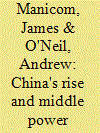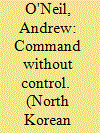|
|
|
Sort Order |
|
|
|
Items / Page
|
|
|
|
|
|
|
| Srl | Item |
| 1 |
ID:
019773


|
|
|
|
|
| Publication |
April 2001.
|
| Description |
55-63
|
| Summary/Abstract |
The inter-Korean summit held in Pyongyang between 13 and 15 June 2000 was an unprecedented event. It was the first time the leaders of North and South have met face to face since the formal partitioning of Korea in 1948. This article examines the main reasons why the 2000 summit occurred, what the summit produced, and its implications for inter-Korean relations in the early part of the 21st century. Although the summit could well be an important step towards breaking down the long-standing barriers of suspicion and mistrust between Pyongyang and Seoul, it is premature to conclude (as some observers have) that the summit has heightened the prospects for reunification on the Korean peninsula. Instead of grandly portraying the 2000 summit as heralding a transition to reunification, it is far more accurate to view it as a positive step towards the more modest objective of longer-term reconciliation between the two Koreas.
|
|
|
|
|
|
|
|
|
|
|
|
|
|
|
|
| 2 |
ID:
094444


|
|
|
|
|
| Publication |
2010.
|
| Summary/Abstract |
Since normalising diplomatic relations in 1972, successive Australian and Chinese governments have focused on deepening trade and investment links to such an extent that China now looms as one of the most critical countries on Australia's twenty-first century horizon. For their part, Chinese elites have welcomed closer ties with Australia and have been particularly keen to accelerate China's direct investment in the Australian mining and energy sectors. Since the early 2000s, a number of commentators have argued that Australia has been gradually drifting towards China's sphere of influence in the Asia-Pacific. This trend, they argue, has been reinforced following the election in 2007 of the Labor party government, which has terminated Australia's involvement in quadrilateral talks with the US, India, and Japan; stepped back from commitments to export uranium to China's long-standing rival, India; and intensified Australia's public criticism of Japanese whaling practices. Meanwhile, in 2008, Prime Minister Kevin Rudd made a point of paying a high profile visit to China during his first major overseas journey, but not matching it with a visit to Japan. Is Australia drifting towards China's strategic orbit in Asia? The article examines this question through the prism of three key indicators of realignment and concludes that, while there is some evidence of Australia accommodating Chinese strategic preferences in Asia, there is no indication that it is realigning itself strategically towards China and away from its long-standing ally, the US.
|
|
|
|
|
|
|
|
|
|
|
|
|
|
|
|
| 3 |
ID:
154812


|
|
|
|
|
| Summary/Abstract |
Aside from NATO, the Five Eyes intelligence network between the USA, the UK, Canada, Australia and New Zealand is the world’s most enduring multilateral arrangement of its type. While the Five Eyes network does not constitute a formal security alliance in the classic sense of the term, it does emulate significant features of how alliances operate in practice, including active burden-sharing and intra-alliance bargaining. Most analysts claim that the USA dictates in hierarchical fashion the terms and conditions of how the Five Eyes network functions, and that junior partners have little alternative but to fall in line if they want to preserve the flow of high-grade intelligence from Washington. Using Australia as a case study, this article shows that a more fluid relationship has been at play, one that challenges conventional assumptions about asymmetrical alliances and the role of junior partners.
|
|
|
|
|
|
|
|
|
|
|
|
|
|
|
|
| 4 |
ID:
113181


|
|
|
|
|
| Publication |
2012.
|
| Summary/Abstract |
Assessments of how international actors are responding to China's rise typically focus on rival great powers or on China's Asian neighbors. In these cases, relative power, geographic proximity, and regional institutions have conditioned relationships with China. The relationship of China with the developing world has mainly been defined by power asymmetry and the appeal of the Chinese governance model to authoritarian regimes. Largely absent from this discussion is an understanding of how Western middle power democracies are responding to China's rise. This article compares how Canada and Australia - two Western democratic states with prominent middle power foreign policy traditions - are responding to the rise of China. The two case studies are similar in many respects: both are resource-based economies with a track record of bilateral and institutional engagement in the Asia-Pacific, and both are key US allies. These similarities allow differences in the Canadian and Australian responses to China's rise to be isolated in the political, economic, and strategic realms.
|
|
|
|
|
|
|
|
|
|
|
|
|
|
|
|
| 5 |
ID:
130547


|
|
|
|
|
| Publication |
2014.
|
| Summary/Abstract |
Purpose-To assess the prospects for managing crises on the Korean Peninsula.
Design/methodology/approach-this article investigates North Korea's nuclear behavior using theories of crisis instability, which focus on the actual or perceived incentives of a nuclear weapon state to strike first during a crisis. Findings-Pyongyang's embryonic command and control capabilities mean that rapid escalation to full-scale conflict is a greater prospect than generally acknowledged. Practical implications-This raises questions about the ability of protagonists to avoid escalation resulting from miscalculation in future crises on the Korean Peninsula and has implications for policy makers in devising strategies to deter North Korea from undertaking behavior that risks escalation while reassuring elites in Pyongyang.
|
|
|
|
|
|
|
|
|
|
|
|
|
|
|
|
| 6 |
ID:
108416


|
|
|
|
|
| Publication |
2011.
|
| Summary/Abstract |
A number of commentators have claimed that the strategic relevance of extended nuclear deterrence is declining in the twenty-first century. This claim is based on three key arguments. First, that the positive effects of extended nuclear deterrence have been exaggerated by its proponents; second, that the rational actor logic underpinning extended nuclear deterrence is increasingly redundant; and third, that extended deterrence using conventional weapons is equally, if not more, effective as extended nuclear deterrence. This article applies these arguments to East Asia, a region where nuclear weapons continue to loom large in states' security equations. In applying each of the above arguments to the East Asian context, the analysis finds that not only is extended nuclear deterrence alive and kicking in the region, but also that in the coming decades it is likely to become more central to the strategic policies of the United States and its key allies, Japan and South Korea. Despite predictions of its demise, US extended nuclear deterrence remains a critical element in East Asia's security order and will remain so for the foreseeable future.
|
|
|
|
|
|
|
|
|
|
|
|
|
|
|
|
| 7 |
ID:
064681


|
|
|
| 8 |
ID:
090869


|
|
|
|
|
| Publication |
2009.
|
| Summary/Abstract |
Writing shortly after North Korea's inaugural nuclear test in late 2006, Jonathan Pollack observed that a decision to proceed with additional testing would constitute compelling evidence that the DPRK deemed the first test results unsatisfactory and that Pyongyang's goals for its nuclear programe are more ambitious than a one-time demonstration of strategic autonomy.
|
|
|
|
|
|
|
|
|
|
|
|
|
|
|
|
| 9 |
ID:
067384


|
|
|
| 10 |
ID:
080240


|
|
|
|
|
| Publication |
Hampshire, Palgrave Macmillan, 2007.
|
| Description |
xi, 199p.
|
| Standard Number |
9781403974662
|
|
|
|
|
|
|
|
|
|
|
|
Copies: C:1/I:0,R:0,Q:0
Circulation
| Accession# | Call# | Current Location | Status | Policy | Location |
| 053073 | 327.1747095/ONE 053073 | Main | On Shelf | General | |
|
|
|
|
| 11 |
ID:
152379


|
|
|
|
|
| Summary/Abstract |
The swearing in of Donald Trump as the 45th President of the United States presages, at the very least, a period of flux in American strategy with respect to the relationship between nuclear weapons and alliances. In this response to three thoughtful rejoinders to our article, “Nuclear weapons, the United States and alliances in Europe and Asia: Toward an institutional perspective,” we clarify key aspects of our argument and discuss why alliance institutions are likely to be relatively robust in the face of change, how they can influence national decision-making, and argue that they may exert a moderating influence over the new administration.
|
|
|
|
|
|
|
|
|
|
|
|
|
|
|
|
| 12 |
ID:
152375


|
|
|
|
|
| Summary/Abstract |
America’s alliances in Europe and East Asia all involve some institutional cooperation on U.S. nuclear weapons policy, planning or employment—from consultative fora in Asia to joint policy and sharing of nuclear warheads in NATO. Such cooperation is often analyzed through the prism of “extended nuclear deterrence,” which focuses on the extension of U.S. security guarantees and their effect on potential adversaries. This article argues that this underplays the importance of institutional factors: Allies have historically addressed a range of objectives through such cooperation, which has helped to catalyze agreements about broader alliance strategy. The varied form such cooperation takes in different alliances also flows from the respective bargaining power of allies and the relative importance of consensus, rather than perceived threats. The article concludes that nuclear weapons cooperation will remain crucial in successful U.S. alliance management, as allies negotiate their relationship with each other in the face of geostrategic change.
|
|
|
|
|
|
|
|
|
|
|
|
|
|
|
|
| 13 |
ID:
082677


|
|
|
|
|
| Publication |
2008.
|
| Summary/Abstract |
As the world moves into a particularly fluid phase of global politics, interdisciplinary engagement between international law and international relations is becoming a critical task. Reformulating how we theorise the 'global' will be central to the development of institutions, laws, policies, and norms that govern how we manage conflict, deal with environmental challenges, smooth out the highly uneven political economy, and allow new political communities to develop beyond the nation-state. The role of international law and international relations scholarship will be central to this endeavour. Practitioners and policymakers have a particular responsibility to help develop and shape new global systems and institutions. Teachers have a responsibility to current and future generations of young scholars to equip them with the requisite intellectual tools for making choices in the policy arena that frequently straddle the various levels of international law and international relations. This article explores how we can begin to improve that process.
|
|
|
|
|
|
|
|
|
|
|
|
|
|
|
|
|
|
|
|
|